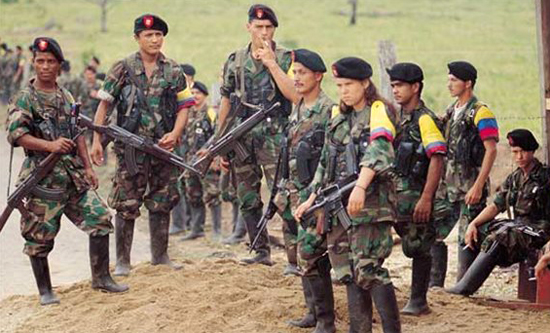
On 20 February, the US government appointed Bernard Aronson, George Bush’s former Assistant Secretary of State for Inter-American Affairs, as a special envoy to the two-and-a-half year long Colombian peace talks in Havana. This is an ominous step. While negotiators have so far reached partial deals on land reform, ending the illegal drug trade, removal of land mines, and participation by former rebels in politics, US requests to extradite at least 60 FARC guerrilla members are a critical barrier to any final agreement.
The 34th round of these talks started on 25 February. President Santos is leading the Colombian ruling class away from its violent and failed strategy to defeat the armed vanguard of the poor – the FARC and the ENL. He is opposed by much of the old landed property class and some military and police organisations which worry that a peace treaty will mean Colombia is unlikely to need 275,000 soldiers, sailors, marines, and airmen any longer.
The US Department of State has offered millions of dollars as a reward for information leading to the capture of FARC commander Jimenez, as well as authorised representatives of the guerrilla movement at the talks, labelling them falsely as major drug traffickers. This is a gross interference; both Santos and his representatives at the peace talks have stated that the FARC is not a drug trafficking organisation.
The US is having to adjust its relations to Colombia in order to maintain its grip on the country, at exactly the same time as it is being forced to change its strategy towards the Cuban Revolution. More peaceful conditions of exploitation are imperative for investors; foreign direct investment is predicted to fall by 20% in 2015 because of falling oil prices. Aronson has a direct interest in the talks: his private equity firm, founded in 1996, has investments in oil projects in both Putumayo and Meta, war zones with a strong FARC presence.
US extradition requests are based on the ‘USA Patriot Improvement and Reauthorisation Act’ of 2005, which established the federal crime of ‘narco-terrorism’. Now US officials no longer need to prove that an individual intended to traffic drugs to the US itself. FARC is on the US State Department’s list of foreign terrorist organisations. The US says these requests are almost ‘impossible’ to withdraw. In response, the FARC-EP peace delegation has demanded the participation of Simon Trinidad, imprisoned in the US and unjustly sentenced to 60 years in prison. ‘We haven’t fought our entire lives for peace with social justice and the dignity of Colombians only to end up locked up in the victimisers’ jails,’ chief negotiator Ivan Marquez said in 2013.
From 20 to 22 March, more than 300 Colombian and international delegates took part in a conference in Bogota for the dignified treatment and release of the more than 7,000 political prisoners in Colombia. It was organised by the National and International Long Life to Butterflies Coalition, under the slogan ‘Social struggle is not a crime; it is a step towards freedom’.
The state’s war on the ground
On 9 March, Colombian troops killed the FARC 57th Front commander Jose David Suarez near the Panamanian border. The next day, Santos announced a halt to aerial bombing for a month, but military operations continue even though he ordered Colombia’s negotiators to start discussions on a bilateral ceasefire in January. Colombia’s military has relied on US technology to hunt and kill top FARC leaders. On 19 March the FARC delegation reluctantly stated that they will end their 17 December 2014 truce if the Colombian military does not stop attacking FARC’s forces.
However, in late March the Colombian army said it had killed six ‘suspected’ FARC fighters and captured another 18. FARC killed a soldier on the weekend of 14/15 March after coming under attack. ‘These attacks on guerrilla units are progressively eroding the FARC’s determination to maintain a unilateral ceasefire indefinitely,’ said Marquez, the rebels’ second-in-command; the ceasefire ‘is dissolving in practice…there have been so many attacks and operations targeting our positions that our people have been forced to respond.’
Racism in Colombia
Two million out of the six million people who are internally displaced by the civil war are Afro-Colombian, yet Afro-Colombians are only 10% of Colombia’s population of 48 million. To be successful, an end to the war must lift a large part of the burden of oppression and subjugation from these communities. Yet they are under no illusion that the abuses they face will suddenly end. The National Conference of Afro-Colombian Organisations represents 246 organisations, and has set up national support networks, including organisations of women, youth, displaced persons, community councils, and urban organisations, in preparation for a new political situation.
On 25 October there are regional and local elections. Last December the Colombian Congress passed a law to allow a constitutional referendum to coincide with these elections, so that a stamp of approval for the final agreement ending the conflict can be obtained on the same day. The US is determined to end the war on as favourable terms as possible for its interests, backing Santos to reduce the people’s demands to the absolute minimum necessary for a period of political stability in which it can continue its plunder of the region.
Alvaro Michaels
Fight Racism! Fight Imperialism! 244 April/May 2015




